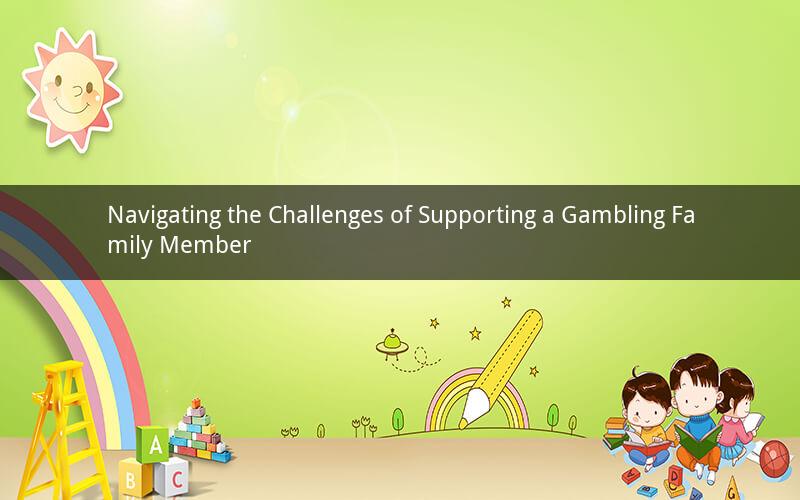
Dealing with a family member who struggles with gambling can be a challenging and emotional journey. It is crucial to approach the situation with empathy, understanding, and a willingness to help. This article explores various strategies on how to deal with a gambling family member, offering guidance on communication, support, and seeking professional help.
1. Understanding the Problem
Before delving into the ways to address the gambling issue, it is essential to understand the problem itself. Gambling addiction is a complex disorder that affects both the individual and their loved ones. Recognizing the signs of gambling addiction can help you identify whether your family member is struggling with this issue.
Signs of Gambling Addiction:
- Preoccupation with gambling thoughts
- Inability to control gambling behavior
- Borrowing money or selling possessions to fund gambling
- Lying to hide gambling activities
- Neglecting responsibilities due to gambling
- Experiencing mood swings or irritability when not gambling
2. Communication
Open and honest communication is key to addressing the gambling problem. When speaking with your family member, approach the conversation with empathy and non-judgment. Here are some tips for effective communication:
- Choose a calm and private setting to discuss the issue.
- Express your concerns without placing blame or judgment.
- Use "I" statements to avoid sounding accusatory, such as "I am worried about you" instead of "You are a problem."
- Listen actively and show empathy for their struggles.
- Avoid arguing or confrontational language.
3. Encourage Professional Help
Encouraging your family member to seek professional help is a crucial step in dealing with their gambling addiction. Professional therapists or counselors can provide personalized support and strategies to overcome the addiction. Here are some ways to encourage them to seek help:
- Suggest seeking a therapist or counselor specializing in gambling addiction.
- Offer to accompany them to the first session for support.
- Research treatment options and share information about support groups.
- Be patient and understanding if they are hesitant or resistant at first.
4. Set Boundaries
Establishing healthy boundaries can help protect you from the negative consequences of your family member's gambling behavior. Here are some tips for setting boundaries:
- Communicate your concerns and the impact their gambling is having on you and the family.
- Avoid enabling their gambling by not providing financial support or covering their debts.
- Limit your exposure to their gambling activities to protect your mental and emotional well-being.
- Seek support for yourself from friends, family, or support groups if needed.
5. Support and Encouragement
Supporting your family member through their journey to recovery is vital. Here are some ways to provide support and encouragement:
- Celebrate small victories and progress in their recovery journey.
- Offer to attend support groups or therapy sessions with them.
- Encourage them to participate in healthy activities and hobbies.
- Be patient and understanding during setbacks, as recovery is a process with ups and downs.
Frequently Asked Questions:
Q1: Can I confront my family member about their gambling addiction if they deny it?
A1: Confronting your family member about their gambling addiction when they deny it can be counterproductive. Instead, focus on expressing your concerns and the impact it has on you and the family. Avoid arguing or forcing them to admit their addiction, as this may push them further away.
Q2: How can I help my family member if they are resistant to seeking help?
A2: If your family member is resistant to seeking help, try to be patient and understanding. Offer support by researching treatment options, suggesting therapists or counselors, and accompanying them to the first session. Remember that the decision to seek help ultimately lies with them.
Q3: Is it my responsibility to pay off my family member's gambling debts?
A3: No, it is not your responsibility to pay off your family member's gambling debts. Enabling their gambling behavior by covering their debts can worsen the situation. Encourage them to seek professional help and explore options for debt management or counseling.
Q4: How can I support my family member during their recovery journey?
A4: You can support your family member by celebrating their progress, offering to attend therapy sessions or support groups with them, and encouraging them to engage in healthy activities. Be patient and understanding during setbacks, as recovery is a process with ups and downs.
Q5: What should I do if my family member's gambling addiction is causing significant harm to our family?
A5: If your family member's gambling addiction is causing significant harm, it is essential to seek professional help. Consider seeking support for yourself from friends, family, or support groups. A therapist or counselor can provide guidance on how to address the situation and protect your well-being during this challenging time.